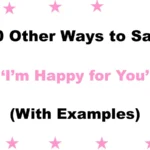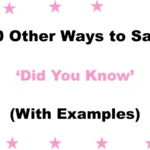Finding the right words to express regret—without sounding too harsh or too casual—can go a long way in maintaining trust, especially in a professional setting. Saying “Sorry for wasting your time“ may come from a genuine place, but it often feels too blunt or self-critical.
Whether you’ve had to cancel a meeting, missed a deadline, or sent someone on a fruitless task, your message should show care, consideration, and accountability—without sounding robotic. This guide shares 30 warm, thoughtful, and professional alternatives that can help you strike that perfect balance and ensure your message lands with sincerity and tact.
What Does ‘Sorry for Wasting Your Time’ Mean?
The phrase “Sorry for wasting your time” is typically used when someone feels they’ve taken up another person’s time unnecessarily or unproductively. It’s often meant to show remorse, humility, and acknowledgment of the other person’s value and effort.
While well-meaning, the wording can come off as too strong, especially in formal or professional contexts where confidence and tact are both important. That’s why finding better ways to convey the same thoughtful intention can lead to more effective communication.
When to Use ‘Sorry for Wasting Your Time’
You might say this when you:
- Schedule a meeting that ends up being unproductive
- Realize too late that you gave someone incomplete or irrelevant information
- Need to acknowledge a mistake that caused unnecessary delay
- Cancel or reschedule at the last minute
Is It Professional or Polite to Say ‘Sorry for Wasting Your Time’?
While the phrase is honest and well-intended, it may not always be the most professional or polished way to phrase your apology. It can sometimes come across as overly self-deprecating or even dramatic in formal environments.
Many professionals and leaders now opt for more positive, proactive expressions that keep the tone respectful while still recognizing the inconvenience caused. The goal is to own the moment without diminishing your credibility.
Pros or Cons of saying ‘Sorry for Wasting Your Time’
Pros:
- Conveys honesty and humility
- Acknowledges others’ time and effort
- Signals accountability
Cons:
- Can sound overly harsh or self-critical
- May come off as unprofessional in formal emails
- Risks lowering your perceived competence or confidence
Synonyms for “Sorry for Wasting Your Time”
- Thank you for your patience
- I appreciate your time
- Thank you for bearing with me
- I value the time you spent
- Apologies for the delay
- Thank you for your understanding
- I understand your time is valuable
- I regret any inconvenience caused
- I realize this took longer than expected
- Thank you for sticking with me
- I know your time is limited
- Apologies for the confusion
- I appreciate your time and patience
- Please know it wasn’t my intention to waste your time
- I value the time you spent on this
- Let me make it up to you
- I’ll be more mindful moving forward
- I apologize if this felt unproductive
- I know we went off track — thank you for staying with me
- I’ll keep it brief next time
- I understand if this caused frustration
- Thanks for bearing with me
- I’ll be sure to respect your time going forward
- I know this wasn’t ideal timing
- Sorry for taking up so much of your day
- I recognize this could’ve been shorter
- Let’s be more time-efficient next time
- I realize I’ve gone on too long
- I appreciate your willingness to hear me out
- Thanks for your continued support despite the delay
1. Thank you for your patience
Definition: A polite expression of gratitude to someone for waiting or enduring a delay.
Detailed Explanation: This phrase acknowledges someone’s patience without framing the situation as a failure. It emphasises gratitude over guilt, which is often more appropriate in professional settings.
Scenario Example: You had to reschedule a Zoom call due to technical issues — “Thank you for your patience while we sorted that out.”
Best Use: When there’s a delay, change in schedule, or need for flexibility.
Worst Use: When the delay was due to a serious oversight or mistake that needs a direct apology.
Tone: Warm, professional, and appreciative
2. I appreciate your time
Definition: Acknowledges and values the time someone has given.
Detailed Explanation: Instead of focusing on how it was “wasted,” this phrase turns the tone toward appreciation and respect, helping you maintain rapport.
Scenario Example: After a meeting that ran too long — “I appreciate your time today and all the insight you shared.”
Best Use: When someone has invested effort into attending a meeting or reading an email.
Worst Use: When no clear benefit came from the time spent.
Tone: Sincere, respectful, and polished
3. Thank you for bearing with me
Definition: Shows appreciation for someone’s tolerance or patience through a challenging moment.
Detailed Explanation: This phrase softens the tone and adds humanity to your message, implying understanding without sounding overly apologetic.
Scenario Example: If you fumbled through a confusing presentation — “Thank you for bearing with me as I clarified the key points.”
Best Use: During rough moments that cause minor confusion or delay.
Worst Use: In highly formal or legal communications.
Tone: Friendly, humble, and conversational
4. I value the time you spent
Definition: A way to show that you respect someone’s effort and engagement.
Detailed Explanation: Rather than apologizing, this phrase communicates gratitude and awareness, maintaining a balanced, professional tone.
Scenario Example: After a call that ended without a decision — “I truly value the time you spent discussing these ideas.”
Best Use: In client meetings or strategic planning calls.
Worst Use: When there was a clear and avoidable failure.
Tone: Respectful, genuine, and professional
5. Apologies for the delay
Definition: A respectful way to acknowledge that something took longer than expected.
Detailed Explanation: This phrase is a direct yet polite apology for time-related issues, often used in emails or formal meetings. It shows accountability without exaggeration.
Scenario Example: You’re responding late to an important email — “Apologies for the delay in getting back to you.”
Best Use: For email delays, project holdups, or late meetings.
Worst Use: When the delay was due to a more serious issue that requires detailed explanation.
Tone: Professional, concise, and responsible
6. Thank you for your understanding
Definition: A way to express appreciation for someone’s patience or tolerance.
Detailed Explanation: This is a graceful expression often used when you know the other person has been inconvenienced but is being patient or forgiving.
Scenario Example: A project delivery is late — “Thank you for your understanding while we finalize the report.”
Best Use: When the issue has already been explained and you want to express gratitude.
Worst Use: When the person clearly expresses frustration and needs more than just thanks.
Tone: Empathetic, warm, and respectful
7. I understand your time is valuable
Definition: A respectful acknowledgment that the other person’s time matters.
Detailed Explanation: This phrase reflects self-awareness and courtesy, showing you don’t take their time for granted.
Scenario Example: You held someone up in a meeting that went long — “I understand your time is valuable, and I appreciate your input today.”
Best Use: During or after time-consuming discussions or meetings.
Worst Use: In casual settings where it might sound overly formal.
Tone: Considerate, professional, and appreciative
8. I regret any inconvenience caused
Definition: A formal expression of apology for any trouble or disruption.
Detailed Explanation: Best used in formal communications, this phrase shifts focus from blame to resolution and acknowledgment.
Scenario Example: After a technical error disrupted a training session — “I regret any inconvenience caused and appreciate your patience.”
Best Use: In professional emails, reports, or customer communications.
Worst Use: In relaxed, internal conversations where it may seem too stiff.
Tone: Formal, composed, and respectful
9. I realize this took longer than expected
Definition: An honest admission that a task or event exceeded its planned duration.
Detailed Explanation: This phrase is ideal when you need to express honesty and accountability without placing blame.
Scenario Example: Wrapping up a client call that ran long — “I realize this took longer than expected, and I appreciate your time.”
Best Use: When closing or reflecting on extended meetings or projects.
Worst Use: If you’re unaware of the delay’s cause or haven’t taken action to correct it.
Tone: Honest, thoughtful, and professional
10. Thank you for sticking with me
Definition: A more casual and warm way to thank someone for staying engaged.
Detailed Explanation: This is a friendly and human way to acknowledge someone’s patience or continued support through a tough moment.
Scenario Example: You hit a rough patch while presenting — “Thank you for sticking with me while I sorted through those numbers.”
Best Use: In internal team settings or informal conversations.
Worst Use: In highly formal or written business correspondence.
Tone: Casual, kind, and conversational
11. I know your time is limited
Definition: A recognition that someone’s schedule is busy and their time is precious.
Detailed Explanation: This phrase shows you’re mindful of their constraints, making your acknowledgment feel extra respectful.
Scenario Example: A client meeting ran longer than scheduled — “I know your time is limited, and I truly appreciate the insights you shared.”
Best Use: When speaking with executives, clients, or busy professionals.
Worst Use: In ongoing, casual team settings where it might sound unnecessary.
Tone: Respectful, humble, and professional
12. Apologies for the confusion
Definition: A gentle way to acknowledge that your message or actions may have caused misunderstanding.
Detailed Explanation: This phrase is helpful when you need to smooth things over without escalating tension. It focuses on clarity rather than fault.
Scenario Example: You sent mixed instructions to a team — “Apologies for the confusion earlier. Here’s the clarified version.”
Best Use: When cleaning up miscommunication in a kind way.
Worst Use: When the issue was serious or involved multiple stakeholders.
Tone: Clear, non-confrontational, and diplomatic
13. I appreciate your time and patience
Definition: A heartfelt thank-you to someone who gave their time without complaint.
Detailed Explanation: This phrase expresses deep appreciation, acknowledging not just the time someone spent but their tolerance during delays or confusion.
Scenario Example: A team member waited through multiple revisions — “I appreciate your time and patience throughout this project.”
Best Use: During project updates, follow-ups, or delays.
Worst Use: When the other person is clearly upset and needs a more direct apology.
Tone: Warm, sincere, and appreciative
14. Please know it wasn’t my intention to waste your time
Definition: A clear, personal statement acknowledging impact without defensiveness.
Detailed Explanation: This shows accountability and empathy while clarifying that you meant no disrespect.
Scenario Example: A client expected different deliverables — “Please know it wasn’t my intention to waste your time; I misunderstood the scope and I’m on it now.”
Best Use: When explaining unintentional issues that caused time loss.
Worst Use: When the incident was due to negligence or repeated mistakes.
Tone: Sincere, explanatory, and humble
15. I value the time you spent on this
Definition: A strong appreciation that communicates worth and recognition.
Detailed Explanation: This phrase centers on gratitude, making the person feel seen for the effort they invested.
Scenario Example: A colleague sat through a long brainstorm session — “I value the time you spent on this and the ideas you shared.”
Best Use: Team meetings, client discussions, or project feedback.
Worst Use: If the person seemed disengaged or uninterested.
Tone: Respectful, affirming, and encouraging
16. Let me make it up to you
Definition: A proactive and empathetic commitment to correct a mistake.
Detailed Explanation: This phrase promises action and restitution, which can rebuild trust after a time-related mistake.
Scenario Example: A deadline was missed — “Let me make it up to you with an early delivery on the next milestone.”
Best Use: In follow-ups after missing deadlines or creating inconvenience.
Worst Use: Without a specific action or if used repeatedly without change.
Tone: Empowering, restorative, and sincere
17. I’ll be more mindful moving forward
Definition: A thoughtful acknowledgment that improvement is coming.
Detailed Explanation: This signals self-awareness and growth, showing you’ve learned from the situation and will act differently.
Scenario Example: You ran late to a recurring meeting — “I’ll be more mindful moving forward to ensure we start on time.”
Best Use: In 1:1s, project retrospectives, or performance discussions.
Worst Use: Without any change in behavior afterward.
Tone: Responsible, introspective, and growth-oriented
18. I apologize if this felt unproductive
Definition: A reflective apology focusing on the other person’s experience.
Detailed Explanation: This phrase allows for open acknowledgment of a possible shortcoming without assuming or assigning fault.
Scenario Example: A strategy call didn’t meet expectations — “I apologize if this felt unproductive; I’ll follow up with a clearer next step.”
Best Use: When a meeting or conversation didn’t meet its goals.
Worst Use: If the time was genuinely well-used — it may come off as too self-critical.
Tone: Gentle, humble, and emotionally intelligent
19. I know we went off track — thank you for staying with me
Definition: A polite way to acknowledge sidetracking and thank someone for their presence.
Detailed Explanation: This phrase helps you regain control of the conversation while expressing gratitude for someone’s attention.
Scenario Example: A client call drifted off-topic — “I know we went off track — thank you for staying with me.”
Best Use: In live discussions or presentations that go longer than expected.
Worst Use: In formal email summaries.
Tone: Conversational, accountable, and grateful
20. I’ll keep it brief next time
Definition: A commitment to being more efficient in the future.
Detailed Explanation: This tells your audience that you recognize the inefficiency and will improve going forward.
Scenario Example: A weekly update dragged — “I’ll keep it brief next time so we’re back on track.”
Best Use: Casual internal meetings or team settings.
Worst Use: If the issue was caused by someone else’s delay.
Tone: Upbeat, efficient, and self-aware
21. I understand if this caused frustration
Definition: A compassionate acknowledgment that your actions may have upset someone.
Detailed Explanation: This phrase validates the other person’s emotions, even if they haven’t openly expressed them. It’s a tactful way to take responsibility without over-apologizing.
Scenario Example: You gave someone incorrect instructions — “I understand if this caused frustration and I’ll make sure it’s resolved quickly.”
Best Use: When someone is likely upset but hasn’t said it directly.
Worst Use: When the issue was lighthearted or clearly didn’t affect them.
Tone: Empathetic, tactful, and emotionally aware
22. Thanks for bearing with me
Definition: A casual yet grateful way to thank someone for their patience.
Detailed Explanation: This is perfect for moments when things didn’t go smoothly, but the tone can stay light and human.
Scenario Example: Your presentation software froze mid-meeting — “Thanks for bearing with me while I got that working.”
Best Use: In meetings, presentations, or real-time errors.
Worst Use: In formal documents or emails.
Tone: Informal, grateful, and personable
23. I’ll be sure to respect your time going forward
Definition: A clear promise to improve time management in future interactions.
Detailed Explanation: This phrase offers personal accountability and a forward-looking commitment, perfect when you’ve taken too much time.
Scenario Example: A long client onboarding call — “I’ll be sure to respect your time going forward and keep things tighter.”
Best Use: After running over in meetings or calls.
Worst Use: If the overuse of time was out of your control.
Tone: Professional, honest, and forward-thinking
24. I know this wasn’t ideal timing
Definition: An acknowledgment that your message or request may have come at a bad moment.
Detailed Explanation: Use this to show sensitivity to someone else’s workload or stress without sounding apologetic for no reason.
Scenario Example: You emailed a request during a colleague’s busy sprint — “I know this wasn’t ideal timing, so I appreciate your response.”
Best Use: In emails or Slack messages when you sense poor timing.
Worst Use: When your timing was actually appropriate — it might create confusion.
Tone: Considerate, aware, and respectful
25. Sorry for taking up so much of your day
Definition: A direct and human way to apologize for a time-consuming request or interaction.
Detailed Explanation: This makes your apology clear without sounding defensive or guilty — great for time-related slip-ups.
Scenario Example: A full-day offsite ran long — “Sorry for taking up so much of your day, and thank you for your energy throughout.”
Best Use: In longer meetings or when someone set aside significant time.
Worst Use: If the person clearly enjoyed or benefited from the time spent.
Tone: Genuine, relatable, and respectful
26. I recognize this could’ve been shorter
Definition: An honest way to admit a meeting or communication ran longer than necessary.
Detailed Explanation: This conveys awareness and respect, helping you appear efficient and humble without over-apologizing.
Scenario Example: You hosted a long retrospective — “I recognize this could’ve been shorter — next time I’ll streamline the agenda.”
Best Use: After meetings or messages that became too lengthy.
Worst Use: When every minute was needed and well-used.
Tone: Self-aware, direct, and courteous
27. Let’s be more time-efficient next time
Definition: A collaborative way to suggest better time management in the future.
Detailed Explanation: This invites shared responsibility without placing blame. It’s helpful when everyone involved contributed to the delay.
Scenario Example: A brainstorming session lacked structure — “Let’s be more time-efficient next time and maybe create a checklist beforehand.”
Best Use: In team settings where collaboration is ongoing.
Worst Use: When only one person (you or they) was responsible.
Tone: Collaborative, positive, and improvement-oriented
28. I realize I’ve gone on too long
Definition: A candid way to check yourself during a long explanation or meeting.
Detailed Explanation: This phrase shows self-regulation, breaking up long-winded moments with honesty and a bit of levity.
Scenario Example: You’re still talking on slide 5 of 20 — “I realize I’ve gone on too long — let’s wrap this up.”
Best Use: In real-time situations like presentations or conversations.
Worst Use: In written communication.
Tone: Light, self-aware, and humble
29. I appreciate your willingness to hear me out
Definition: A kind thank-you for someone’s attention, especially during lengthy discussions.
Detailed Explanation: This reflects emotional gratitude, especially when you’ve spoken at length or shared something complex.
Scenario Example: You’ve just presented a new plan — “I appreciate your willingness to hear me out and consider the ideas.”
Best Use: After long explanations, feedback sessions, or creative pitches.
Worst Use: In rushed or very formal communications.
Tone: Warm, appreciative, and thoughtful
30. Thanks for your continued support despite the delay
Definition: A respectful thank-you acknowledging both the delay and the other person’s patience.
Detailed Explanation: This phrase merges accountability with gratitude, reinforcing the relationship while recognizing the inconvenience.
Scenario Example: You were late delivering a report — “Thanks for your continued support despite the delay; I truly appreciate your flexibility.”
Best Use: In client relations, stakeholder updates, or team leadership.
Worst Use: In situations with ongoing unresolved issues.
Tone: Professional, affirming, and appreciative
Conclusion
Finding the right words to express regret without sounding overly apologetic or unprofessional can make all the difference in how you’re perceived. Instead of defaulting to “Sorry for wasting your time,” choosing more thoughtful and specific alternatives helps preserve respect, warmth, and trust in your communication. Each of these phrases provides a unique tone—some more formal, others casual—allowing you to tailor your message depending on the context and relationship.
Whether you’re closing a long meeting, correcting a miscommunication, or following up after a delay, these expressions give you tools to acknowledge the inconvenience gracefully. They convey accountability, empathy, and professionalism without undermining your own confidence or credibility. Mastering these alternatives can elevate your communication and deepen connections in every setting. In business or life, people don’t just remember what you said—they remember how you made them feel.
FAQs
1. What’s the most professional way to say “Sorry for wasting your time”?
The most professional option is “Thank you for your time and patience” because it focuses on appreciation rather than guilt. It maintains professionalism and positivity while still acknowledging the other person’s effort.
2. Can these alternatives be used in formal emails and meetings?
Yes, most of these alternatives are appropriate for formal settings, especially phrases like “I appreciate your patience” or “Thank you for your understanding.” Just match the tone to the formality of the situation.
3. When should I avoid saying “Sorry for wasting your time”?
Avoid using this phrase when you’re not clearly at fault or if the time spent was productive overall. It can come off as self-deprecating or dismissive of the value the other person got from the interaction.
4. Do these alternatives also work in customer service scenarios?
Absolutely. Customer service reps can use options like “I appreciate your patience as we work through this” or “Thanks for bearing with us” to maintain a calm and courteous tone while still acknowledging delays or confusion.
5. What’s the best way to sound sincere without sounding weak?
Use specific, emotionally intelligent language that acknowledges the situation without excessive apology. Phrases like “I recognise this could’ve been handled better” or “I understand if this caused frustration” strike the right balance between strength and sensitivity.

Mia Rose is a passionate Language Coach and Contributor at GrammarPeaks, where she specializes in practical grammar tips and language learning strategies. With a strong foundation in education and communication, Mia brings a friendly, approachable style to her writing. Her goal is to make complex grammar rules simple and usable for learners at any level, helping them grow in both confidence and fluency.





